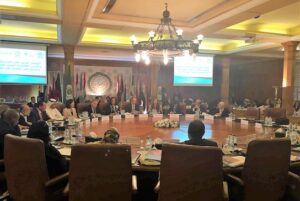Following Arab League Conference, Calls for Nationality Law Reforms for Gender Equality in the Middle East
In a first for the region, government and civil society leaders from across the Middle East-North Africa (MENA) region convened at the Secretariat of the League of Arab States in Cairo to discuss the need to enact nationality law reforms to uphold gender equality. Held October 1-2, 2017, and cosponsored by the Arab League, the United Nations Refugee Agency, UN Women, UNICEF, and the Global Campaign for Equal Nationality Rights, the “Conference for Arab States on Good Practices & Regional Opportunities to Strengthen Women’s Nationality Rights” resulted in a groundbreaking and ambitious outcome statement (Arabic / English), endorsed by the Secretary General of the Arab League. The statement calls on Arab League Member States to uphold equal nationality rights for all citizens, regardless of gender, and to nominate national focal points to brief the Arab League on this issue.
 While gender-discriminatory nationality laws persist in many regions, the highest concentration – 19 out of 52 countries (36%) – is in the MENA region. Fourteen countries in the region deny women the ability to pass nationality to their children on an equal basis with men.
While gender-discriminatory nationality laws persist in many regions, the highest concentration – 19 out of 52 countries (36%) – is in the MENA region. Fourteen countries in the region deny women the ability to pass nationality to their children on an equal basis with men.
The 80+ participants included representatives of Arab League Member States, civil society, parliamentarians, and senior representatives of international and regional bodies, including the Arab Interior Ministers Council, the Arab Parliament, Organization of Islamic Cooperation, and United Nations Office of the High Commissioner for Human Rights.
“The conference is the first of its kind and paves the way for League of Arab States Member States to discuss and agree on women’s nationality rights.” – Dr. Inas Mekkawy, Director of Department of Women, Family, and Childhood, League of Arab States
Conference participants discussed the benefits of nationality law reforms in Algeria, Egypt, Morocco, Tunisia, and Yemen, all of which enshrined the right of women citizens to confer nationality on their children on an equal basis with men. Civil society leaders highlighted the significant hardships and rights violations experienced by families, due to women’s inability to pass their nationality to their children and spouses on an equal basis with men in many countries in the region. Such laws can result in family separation and deprive affected persons of access to education, healthcare, employment, inheritance and property rights, civil rights, and freedom of movement. Gender discrimination in nationality laws is also a leading cause of statelessness in the region.

In addition to endorsing the Conference Outcome Statement, regional civil society leaders released a separate communiqué outlining activists’ demands for nationality laws to reflect women’s status as equal citizens – a status enshrined in many of the region’s constitutions and international conventions.
“We, as citizens, look forward to living in modern States that respect the principle of equal citizenship for everyone regardless of gender.” – Statement by civil society leaders, following participation in the Conference for Arab States on Good Practices & Regional Opportunities to Strengthen Women’s Nationality Rights
The Global Campaign for Equal Nationality Rights welcomes commitments made by governments in the MENA region to take urgently needed steps to reform nationality laws to uphold the equality of all citizens, regardless of gender. We also welcome the attention given to this critical issue by the League of Arab States, and the League’s dedication to continue to work with Member States to realize gender-equal nationality rights.
